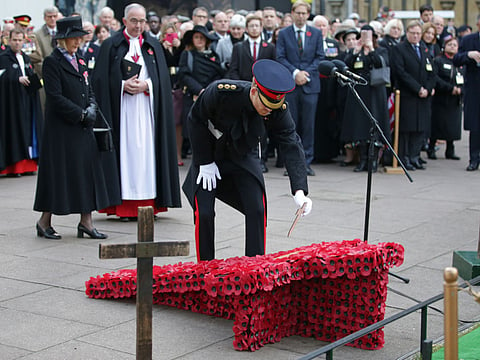All the conflicts in the world are caused by too much remembering
Let us try and move on, consigning the 20th century to where it belongs — history’s recesses

Enough of Remembrance Day. The wars of the 20th century are beyond the experience of the overwhelming majority of people. We really ought to get over these Remembrance days. Next year, we should draw down the curtain and have a Forgetting Day, a Move On Day, a Fresh Start Day.
I have a passion for history and am shocked at how badly it is taught, in particular the neglect of chronological narrative. When my son was learning that now-obsessive school topic, Hitler, he said: “I know about the Second World War, but what was the First?”
We are told we must remember, “lest we forget” and thus avoid the same mistakes again. I wonder how many remembrance days it takes for that to come true. “Learning the lesson” has long been history’s chief sales pitch. It must be its greatest failure.
All nations honour their moments of revolution, triumph and nation-building. Most are excuses for fake history. I was brought up to regard V-E Day as when “we” defeated Hitler. Russia defeated Hitler; we helped.
This week, the BBC has remembered Russia’s October Revolution as the overthrow of a Tsarist tyranny. That centenary was in February. October was a coup against an incipient democracy by a Communist dictator. But then no one now commemorates the American Revolution as a victory for slavery. History is always defined by the victors.
Britain’s Remembrance Day is not fake history. The agonies it recalls were real enough, and there is no danger of them being ignored. But I sense we would not celebrate them were they defeats. We remain fixated on the German wars, with war histories, war biographies, war movies and war memorabilia. I am told there are 8,000 war titles currently in print, outgunning similar books in all other European countries together. Every night is Nazi night somewhere on British television.
Former British prime minister David Cameron in 2011 had even appointed a minister for “remembering the First World War”, Andrew Murrison, and gave him a staggering £50 million (Dh241.62 million). What about remembering Trafalgar Day, Waterloo Day and, for that matter, Guy Fawkes? They all portray foreigners as objects of hatred, ridicule and condemnation. Why do we strive to keep alive these old antagonisms and feuds? Such memorialism continues to devote astronomical sums to remembered threats and archaic strategies, such as submarine warfare, convoy protection, aerial dogfighters and manned bombers.
We should not be remembering, but forgetting. Almost all the conflicts in the world are caused by too much remembering: Refreshing religious divisions, tribal feuds, border conflicts, humiliations and expulsions. India and Pakistan seem unable to get over memories of Partition. What ancient grievances motivated Myanmar’s viciousness against the Rohingya?
It is equally reasonable to ask if we need another Holocaust memorial in London, in the shadow of the Palace of Westminster. There is already a beautiful one in Hyde Park, but apparently this is not prominent enough for the lobbyists. The implication can only be that we are all somehow “implicated” in the Holocaust and need to be reminded of it, at which point I despair. As Jorge Luis Borges wrote: “The only vengeance and the only forgiveness is in forgetting.”
Identity politics is explosive enough without drenching it in the fuel of history. An upsurge in Europe’s remembered complaints is threatening its stability. The Catalans have no substantive dispute with Madrid, beyond seeking a remembered separatism. The Scots’ case for independence is not the outcome of some present oppression, but of a congeries of past slights and indignities.
Memory sustains ongoing disputes in the Balkans, the Levant and Mesopotamia. Closer to home, it is the curse of Northern Ireland, preserving a primitive religious antagonism and leaving the streets decked in King Billy against the Pope.
In his recent book, In Praise of Forgetting, David Rieff warns against “obsessive retrospection as a formula for unending vendetta”. Such emotion encourages distortion, aggression and conspiracy theories. Rieff wonders at the virtue of a commemoration that “at best is a consolation and an ego boost, at worst a wallowing ... in past triumphs, injuries and traumas”.
Nelson Mandela was aware of this. His great ambition in 1990s South Africa was to pass through the gates of “truth and reconciliation” and draw a line under his country’s recent history. He sought that favoured concept in criminal psychology, closure. Can Britain not find closure on the 20th century?
Remembering is easy. Forgetting is hard — in personal relationships as in a nation’s collective response to the world around it. The task is not to ignore some past event, but to view it in proportion, to find some compromise between present and past. Throughout history, societies that do this, that manage to “let the dead bury their dead”, have tended to succeed and move forward. Those that cannot forget, that wander the stony paths of their past and drink at the rancid well of grievance, are those that decay from within.
We must write the wars of the 20th century into its history books. We should then move on. It is time to remember the future. No more remembrance days.
— Guardian News & Media Ltd
Simon Jenkins is a senior Guardian columnist.



